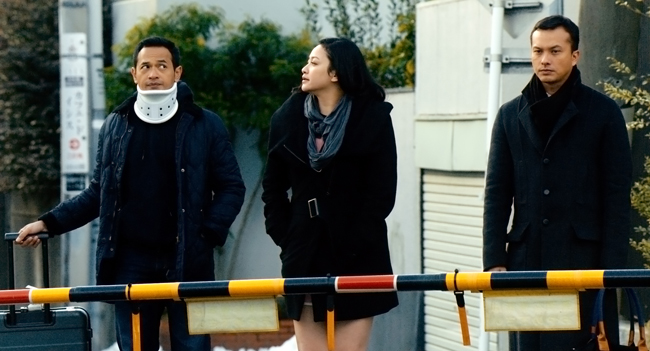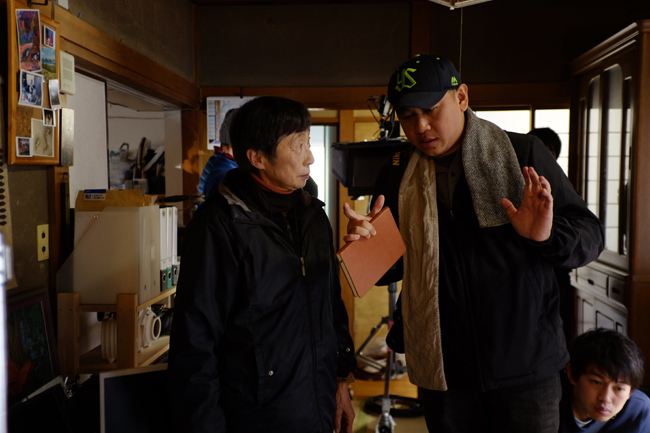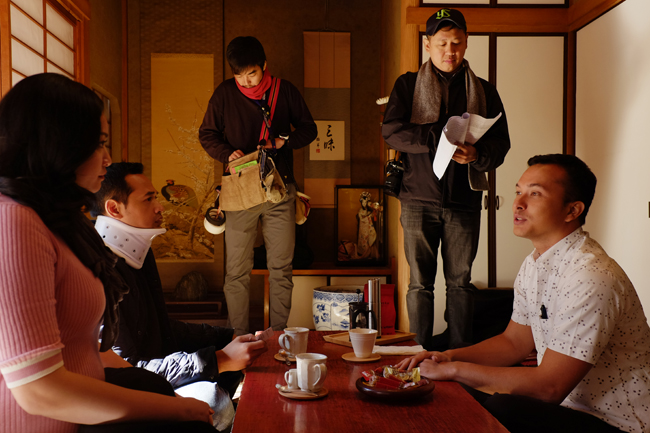Reflecting the abnormal experience in Tokyo; Variable No.3 (Edwin)
Ishizaka: So, moving on to Edwin's episode Variable No.3, it was shot in Tokyo, Japan. You worked with Ms. Akiko Ashizawa*3 , one of the major female cinematographers in Japan known for Kiyoshi Kurosawa films. Where in Tokyo did you shoot?
*3 One of the representative camerawomen in Japan. She has been working with renowned directors such as Kiyoshi Kurosawa and Shuichi Okita as a director of photography, and was nominated for Best Cinematography (Chronicle of My Mother / Dir: Makoto Harada) at the 2013 Japanese Academy Awards. Her recent works include Daihachi Yoshida's The Scythian Lamb (2018) and Koji Fukada's The Man from the Sea (2018).
Edwin: We shot in Jiyugaoka, Todoroki Valley and at a hotel in Kinshicho. Right before shooting, we had really bad snow, the biggest snowfall in Tokyo in the past four years. It was very cold, but snow is very nice to look at.
Ishizaka: So, you shot in very different places in Tokyo. Now this episode captures a married couple in a tired relationship which changes when a new element intervenes. I saw two aspects in this episode: "Tension" and "Release", but is this a correct interpretation of your episode's theme?
Edwin: Yes, the idea of the title "Variable No.3" is quite simple; the relationship of the couple is to be challenged by this third element, which symbolizes their past. I see the context of "journey" in this episode as simple, as they physically move from Jakarta to Tokyo, but it is more important for their relationship's inner journey whether they continue their lives together as a couple or not. In order to move forward, they need to deal with their past.

Ishizaka: I think it is based on your own personal feeling but at the same time is it also a metaphor for the historical relationship of your country?
Edwin: I am very interested in the concept of time; past, present and future, especially past and present is something I subconsciously capture and believe it is not finished, especially with Indonesian history of course. I would like to say that this kind of film is very personal for me, and it is the way to understand my position as a filmmaker. In Indonesia, we don't really talk about history and political stuff openly because I think we buried a lot of scars and lies, and are still not able to face the past openly. I think it is a really big problem in order for us to progress into the future, and we need to seriously address the past. As Daishi depicts the change of the speed in Myanmar in Hekishu, I would say that Indonesia is also going in the same direction, especially with the metro system under construction in Jakarta, and the communication culture is growing very fast which is creating a crazy social media. I am really worried about this progress, this very fast progress and yet we are still afraid to talk about our past.

Ishizaka: You engaged some Japanese filmmakers who have collaborated with Indonesians before, such as the actor Kazuki Kitamura (Killers / 2013) and director Koji Fukada (The Man from the Sea / 2018). They participated in the scene on the bridge in Jiyugaoka as extras. Could you explain about this scene?
Edwin: Actually, this particular scene was originally not in the script. We only wrote it after we arrived in Tokyo and visited the locations with our Japanese crew. It was the first day when it snowed badly, when my crew and I got stuck in Shibuya station for about two hours queuing to get into the train. We were pushed inside the train and packed in with hundreds of people. I felt quite thrilled to experience this, although I know that this must be a usual situation for the Japanese. Anyway, I could not feel my leg and then when the doors opened, I felt so relieved. That kind of feeling was what I really wanted to capture in an image. The suppressed feeling of being pushed in to contact with each other and then the relief after that.

Ishizaka: It is true that this is something we do every day, so I found it interesting. Degena and Daishi, what do you think of Edwin's work?
Degena: I personally felt really related to his message because China is in a similar situation where everything happens so fast. There are tensions in between this panic feeling in everyone, but we are trying not to face it. And apart from that, it is also the isolation that I feel and actually I've talked with Daishi that being a director is really lonely. And not only directors, but I feel that even though we talk so much we are actually not able to communicate with each other. That is how I feel. So, I strongly felt that in Edwin's film, and I also admire how he bravely put a sex scene in the movie. I am not brave enough to do it, and this great work really gave me an interesting experience. Also, maybe because it was shot by a Japanese cinematographer, I kind of found a traditional Japanese cinematic style in this Indonesian Romance and that was very interesting.
Matsunaga: I think this is what makes this project interesting. So, when you see these three episodes as an omnibus, firstly Degena depicts the lost parent-child relationship and its re-establishment. Then my episode depicts the change of time which is something universal, and then Edwin depicts the relationship of a couple. Both stories of Degena and Edwin are based on personal experience, but without doubt they will resonate with people worldwide. What is visible and tangible in his episode might be tricky, but once you find a hidden message you can resonate with yourself, and in today's world this is something that people all agree, but do not speak out loud. As Degena said, he has the courage to bring it out and this is something I am not able to do. Also, in his episode I could see a Japan that I have never seen; this was very edgy and eye-opening.






